Related Research Articles
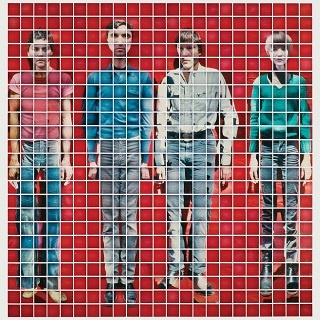
More Songs About Buildings and Food is the second studio album by American rock band Talking Heads, released on July 14, 1978, by Sire Records. It was the first of three albums produced by collaborator Brian Eno, and saw the band move toward an increasingly danceable style, crossing singer David Byrne's unusual delivery with new emphasis on the rhythm section composed of bassist Tina Weymouth and drummer Chris Frantz.
Over the Edge is a sound collage radio program hosted and produced in the United States by Jon Leidecker ("Wobbly") and Robert Cole ("KrOB"), who took over in 2015 after the death of longtime host Don Joyce.
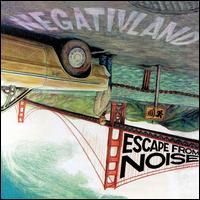
Escape from Noise is the fourth studio album by Negativland. It marked the band's first release on an established independent record label, SST Records. On the album, they continued to develop their experimental style, as well as incorporating elements of pop music with shorter tracks and more conventional melodies. "Christianity Is Stupid", a track featuring samples from the propaganda movie If Footmen Tire You, What Will Horses Do?, proved to be an enduring signature song: the band and the release gained widespread attention a year later due to an SST press release falsely implying that murderer David Brom had listened to the song before killing his family members.

Helter Stupid is Negativland's fifth studio album, released in 1989. It is a concept album that focuses on a hoax that the band started, which claimed that the Negativland song "Christianity Is Stupid" inspired a teenager to murder his family with an axe.

Robert Thomas Christgau is an American music journalist and essayist. Among the most well-known and influential music critics, he began his career in the late 1960s as one of the earliest professional rock critics and later became an early proponent of musical movements such as hip hop, riot grrrl, and the import of African popular music in the West. Christgau spent 37 years as the chief music critic and senior editor for The Village Voice, during which time he created and oversaw the annual Pazz & Jop critics poll. He has also covered popular music for Esquire, Creem, Newsday, Playboy, Rolling Stone, Billboard, NPR, Blender, and MSN Music, and was a visiting arts teacher at New York University. CNN senior writer Jamie Allen has called Christgau "the E. F. Hutton of the music world – when he talks, people listen."

The Weatherman's Dumb Stupid Come-Out Line was the third volume in the Over the Edge series, which distills the best material from Negativland's radio program Over the Edge, broadcast on KPFA. This album was edited together from several different broadcasts recorded between 1982 and 1984.

"Helter Skelter" is a song by the English rock band the Beatles from their 1968 album The Beatles. It was written by Paul McCartney and credited to Lennon–McCartney. The song was McCartney's attempt to create a sound as loud and dirty as possible. It is regarded as a key influence in the early development of heavy metal. In 1976, the song was released as the B-side of "Got to Get You into My Life" in the United States, to promote the Capitol Records compilation Rock 'n' Roll Music.

Pazz & Jop was an annual poll of top musical releases, compiled by American newspaper The Village Voice and created by music critic Robert Christgau. It published lists of the year's top releases for 1971 and, after Christgau's two-year absence from the Voice, each year from 1974 onward. The polls are tabulated from the submitted year-end top 10 lists of hundreds of music critics. It was named in acknowledgement of the defunct magazine Jazz & Pop, and adopted the ratings system used in that publication's annual critics poll.
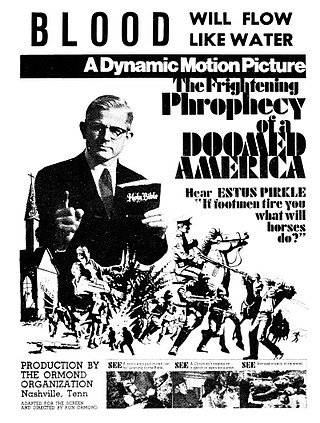
If Footmen Tire You, What Will Horses Do? is a 1971 American Christian film directed by Ron Ormond.
"Getting in Tune" is a song written by Pete Townshend and originally released by the Who on their 1971 album Who's Next. It was originally written as part of Townshend's abandoned Lifehouse project. Its lyrics describe the power of music, as well as reflect the inner contradictions Townshend was feeling at the time between his spiritual needs and his persona as a rock star. The music incorporates a number of changes in tempo and has been praised by critics for its use of dynamics.
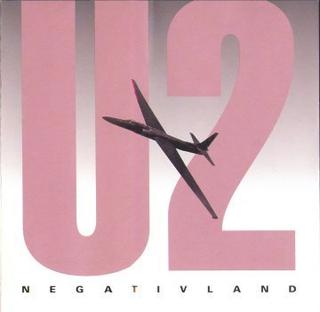
U2 is a withdrawn EP by the experimental music and sound collage band Negativland, released in 1991. The EP and the band gained notoriety when lawyers representing Island Records, the record label of the band U2, sued over misleading artwork and the use of unauthorized sampling.

WYSIWYG is the ninth studio album by English rock band Chumbawamba, released on 4 April 2000 by EMI. The album was written and produced by Chumbawamba, with additional production by Neil Ferguson. Originally a continuation of the sound of predecessor Tubthumper (1997), the group scrapped the material from the album's initial recording sessions and sought to explore new sounds with WYSIWYG. The album incorporates elements of pop, dance-pop, alternative rock, and experimental music. Thematically, the album explores various aspects of pop culture that the group had been exposed to due to the success of their 1997 single "Tubthumping". WYSIWYG was promoted with one single: "She's Got All the Friends That Money Can Buy".
"Christianity Is Stupid" is a song from Negativland's 1987 concept album, Escape from Noise.

Our Favorite Things is a compilation DVD by the band Negativland, released on November 27, 2007. The original release date on October 23 was skipped due to a pressing error in the DVDs and the bonus CD, a collection of Negativland covers done by an a cappella doo-wop group. It contains 20 of the band's greatest "hits" animated by 20 different artists from all over the United States. The cover parodies the artwork of the film The Sound of Music as well as title of the film's song "My Favorite Things". The front features a "review" from the character Goofy saying, "It's goofy". The people on the cover are dolls.

Negativ(e)land: Live on Tour is a 1997 live album, released by SST Records. It was released against the wishes of the band, who had left SST following the U2 Scandal. It was released to compete with Dispepsi, a Negativland album.
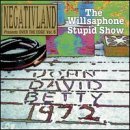
The Willsaphone Stupid Show is a two CD collection of recordings edited from two different broadcasts on KPFA's Over the Edge radio show, hosted by Don Joyce.
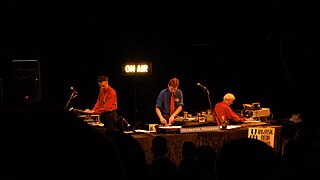
Negativland is an American experimental music band that originated in the San Francisco Bay Area in the late 1970s. They took their name from a Neu! track, while their record label is named after another Neu! track. The core of the band consists of Mark Hosler, David Wills, Peter Conheim and Jon Leidecker.

Thigmotactic is the eleventh album by sound collage group Negativland. Unlike previous efforts by the band, it is primarily the expression of one member, Mark Hosler, though other members contributed, as did Thomas Dimuzio. Hosler created the bulk of its audio content as well as the visual collages and assemblages of found objects that are pictured in the liner notes. It is also notable as the band's "first entirely song-based project" and features fifteen songs and two instrumental pieces.

"Love on the Weekend" is the lead single from American musician John Mayer's seventh studio album The Search for Everything. The song premiered on November 17, 2016.
Quickies is the twelfth studio album by The Magnetic Fields. The album consists of 28 songs, each of which is between 0:17 and 2:35 in length. For the album's conceit, Magnetic Fields singer and songwriter Stephin Merritt was influenced by the short fiction of Lydia Davis and the writing of his own book of Scrabble poetry.
References
- ↑ Negativland: Helter Stupid, by Cameron Macdonald; published February 22, 2005; retrieved December 28, 2016
- ↑ All's Fair in Love and Negativland, by Dimitri Nasrallah, in Exclaim! ; published January 1, 2006; retrieved December 28, 2016
- ↑ Negativland, by Robert Christgau; retrieved December 28, 2016